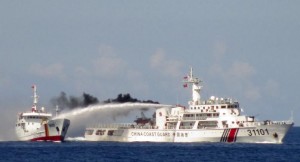BY BEN BLANCHARD AND NGUYEN PHUONG LINH

REUTERS/Vietnam Marine Guard/Handout via Reuters
(Reuters) – China accused Vietnam on Thursday of intentionally colliding with its ships in the South China Sea, but called for talks to end a bitter row sparked by Beijing’s parking of a giant oil rig in contested waters.
A senior foreign ministry official in Beijing demanded that Vietnam withdraw its ships after its southern neighbor asserted that Chinese vessels used water cannon and rammed eight of its vessels at the weekend near the rig. Hanoi said two vessels were badly damaged and six people were wounded in the worst setback to ties between the two Communist nations in years.
China said the drilling operations were being carried out in its territory and it had acted with the “utmost restraint” in using water cannons in response to rammings it blamed on Vietnam.
Yi Xianliang, deputy director-general of the Ministry of Foreign Affairs’ Department of Boundary and Ocean Affairs, said China had only sent civilian vessels to the area while Hanoi sent several armed ships.
“Our aim, our only aim, is to guarantee our reasonable, legal, normal drilling operations,” Yi said, adding China had no choice but to increase its security measures in response to what he said was Vietnam’s provocations.
“The operations by China in the waters off Triton Island in the Paracel Islands are China’s sovereign right and have nothing to do with Vietnam,” he told reporters at a hastily-arranged press briefing, referring to the part of the South China Sea where the rig has been operating.
China has parked about 80 ships around the rig, Vietnamese officials have said, adding that seven of them were military. Its foreign ministry has shown reporters what it said were video clips of Chinese ships hitting Vietnamese Seaguard vessels.
“We don’t care about what China said,” Ngo Ngoc Thu, vice commandant of Vietnam’s coast guard, told Reuters on Thursday.
“We have been only doing our job which is protecting our territory and sovereignty. We only sent ships following the laws but China has missile ships supporting its civilian ships.”
Yi’s comments were a departure from earlier remarks by Vice Foreign Minister Cheng Guoping, who said he believed there had been no “clash” at sea, although he said he did not have detailed knowledge of what had happened.
China was willing to try and resolve the issue with Vietnam via talks, but Hanoi had to withdraw its ships, Yi added.
“We can appropriately resolve this issue. We have the ability, the confidence and the wisdom to do so,” he said.
The two Communist nations have sought to put aside border disputes and memories of a brief border war in 1979. Vietnam is usually careful about comments against China, for which it relies on for political support and bilateral trade that surpassed $50 billion in 2013.
Still, Hanoi has strongly condemned the operation of the drilling rig, the first such action by Beijing in contested waters, and told the owners, China’s state-run oil company CNOOC, to remove it.
LEGAL ACTION
Hanoi has also hinted at international legal action and said it had requested dialogue with China’s leadership, but was awaiting a response.
Daniel Russel, the U.S. Assistant Secretary of State for East Asia and Pacific, reiterated Washington’s concerns about “dangerous conduct and intimidation by vessels” in the disputed area. He met senior Vietnamese leaders on Thursday and said the row had been discussed at length.
“It’s fair to say both Vietnam and China have rights to claim sovereignty over the Paracels (islands),” Russel told reporters in Hanoi.
“It is not for the U.S. to say which position is stronger. It’s within the rights of the United States and the international community to call all parties to address the dispute in a peaceful way.”
The row with its neighbor sent Vietnam’s stocks markets plummeting on Thursday. The benchmark VN Index in Ho Chi Minh City closed down 5.9 percent, its biggest one-day fall in nearly 13 years, while the smaller Hanoi bourse dropped 6.4 percent, its biggest slump since May 2010.
The row comes days after U.S. President Barack Obama visited Asia to underline his commitment to allies including Japan and the Philippines, both locked in territorial disputes with China.
Obama, promoting a strategic “pivot” towards the Asia-Pacific, also visited South Korea and Malaysia, but not China. Washington has been trying to court Vietnam as a new ally in the region with trade and military incentives, ostensibly to lessen Hanoi’s uneasy dependence on Beijing.
However, regional military and diplomatic sources who have been briefed on U.S. navy movements said Washington had not deployed any warships close to the disputed area, although routine surveillance flights over the South China Sea were on-going.
Tensions are also brewing in another part of the sea, with Beijing demanding that the Philippines release a Chinese fishing boat and its crew seized on Tuesday off Half Moon Shoal in the Spratly Islands.
Philippine police said the boat and its crew were seized for hunting sea turtles, which are protected under local laws.
(Additional reporting by Greg Torode in Hong Kong, Sui-Lee Wee in Beijing, Mai Nguyen in Hanoi and Manuel Mogato in Manila; Writing by Michael Martina and Martin Petty; Editing by Raju Gopalakrishnan)







